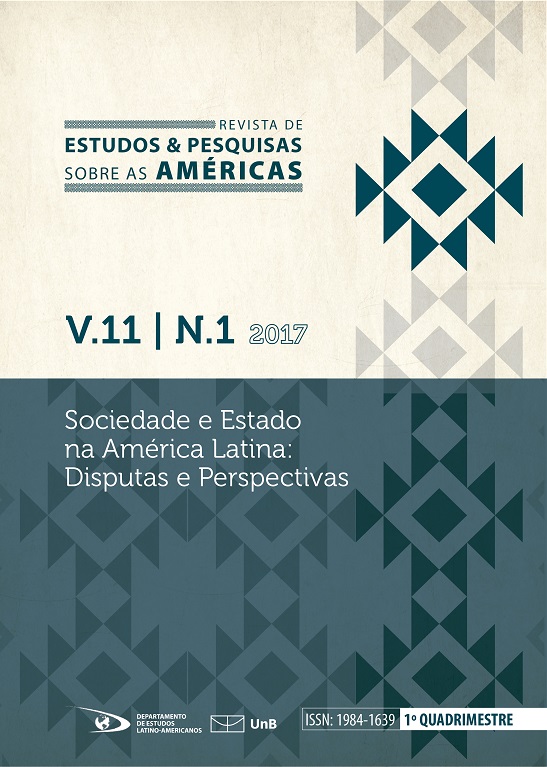Estado, Sociedad e Integración Regional: Un estudio sobre el componente relacional del Mercosur (2003-2015)
Keywords:
Ciências Humanas; Ciência PolíticaAbstract
Resumen
El objetivo de este trabajo es abordar, mediante un análisis bibliográfico y documental, la cuestión de la participación y control social en el ámbito del Mercosur (2003-2015) desde una perspectiva institucional, efectuando una serie de consideraciones a la luz de conceptos oriundos de los campos de estudio de la ciencia política y de la administración pública. Después de presentar el apartado teórico-conceptual, realizamos un histórico del Mercosur, a efectos de contextualizar su evolución, sobre todo en los últimos quince años. Seguidamente, realizamos un estudio sobre el tema propuesto en este trabajo. Afirmamos que, si bien se han registrado algunos avances en términos de oportunidad de participación en el ámbito del bloque en los años recientes, tales avances no han sido acompañados por una verdadera reforma democrática de la estructura institucional del proceso de integración, por la creación de mecanismos de control social, y por una política de transparencia y de acceso a la información, necesarios para ampliar la base de legitimidad del emprendimiento asociativo.
Palabras clave: Estado; Sociedad; Mercosur; Participación y Control Social.
Â
Estado, Sociedade e Integração Regional: Um estudo sobre o componente relacional do Mercosul (2003-2015)
Resumo
O objetivo do presente trabalho é abordar, através de uma análise bibliográfica e documental, a questão da participação e controle social no âmbito do Mercosul (2003-2015) sob uma perspectiva institucional, efetuando algumas considerações à luz de conceitos provenientes dos campos de estudo da ciência política e da administração pública. Após apresentar a seção teórico-conceitual do trabalho, é realizado um breve percurso pela história do Mercosul para fins de contextualizar a evolução do bloco, particularmente nos últimos quinze anos. Em seguida, é levado a cabo o estudo do tema proposto neste trabalho. É afirmado que, apesar dos avanços registrados em termos de oportunidade de participação social no âmbito do bloco nos anos recentes, tais logros não têm sido acompanhados por uma verdadeira reforma democrática da estrutura institucional do processo de integração, pela criação de mecanismos de controle social, e por uma política de transparência e de acesso à informação, necessários para ampliar a base de legitimidade do empreendimento associativo.
Palavras-chave: Estado; Sociedade; Mercosul; Participação e Controle Social.
Â
State, Society and Regional Integration: A study on the relational component of Mercosur (2003-2015)
Abstract
This paper aims to discuss, through a bibliographic and documentary analysis, the issue of citizen participation and social control from an institutional perspective in Mercosur (2003-2015). We start the article by providing a theoretical-conceptual section. After that, a historical overview of Mercosur will be made starting, in order to contextualize its evolution, especially in the last fifteen years. After that, we approach our proposal. We affirm that, although some progress has been made in terms of opportunities for participation in the bloc’s scope in recent years, such advances have not been accompanied by a real democratic reform of the institutional structure of the integration process, by the creation mechanisms of social control, by and a policy of transparency and access to information, which is necessary to broaden the base of legitimacy of the integration process.
Keywords: State; Society; Mercosur; Citizen Participation and Social Control.
Downloads
Downloads
Published
How to Cite
Issue
Section
License
The published material is the property of the Journal, and may be reproduced in whole or in part with indication of the source.
Copyright: Authors will be responsible for obtaining the copyright of the material used. Authors who publish in this journal agree to the following terms:
a)Authors retain the copyright and grant the journal the right of first publication, with the work simultaneously licensed under
the Creative Commons Attribution License which allows the sharing of work with acknowledgment of authorship and initial publication in this journal.
b) Authors are authorized to take additional contracts separately, for non-exclusive distribution of the version of the work published in this journal (eg, publish in institutional repository or as a book chapter), with acknowledgment of authorship and initial publication in this journal.
c) Authors are allowed and encouraged to publish and distribute their work online (eg in institutional repositories or on their personal page) at any point before or during the editorial process, as this can generate productive changes as well as increase the impact and the citation of the published work (See The Effect of Free Access).
















